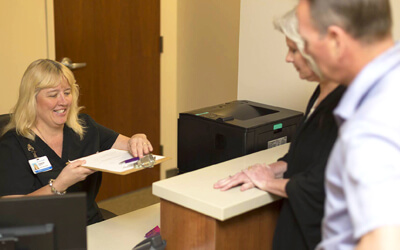Patient Rights and Privacy
Understanding your patient rights and responsibilities helps you and your healthcare team manage your care
There is no such thing as a dumb question as far as your health is concerned. You have a right to know and understand. You have a right to express your concerns, doubts and fears, and to be heard.
Patient Rights
OhioHealth is committed to honoring the following patient rights:
- Cultural, psychosocial, spiritual and personal values, beliefs and preferences
- Confidentiality, privacy and security
- Support services, such as interpreter
- Full information about outcomes of care, treatment and services, so that you can make the best decisions
- Active participation in your care, treatment and service
- Living wills, power of attorney documents and other advance directives
- Ethics consultation
- The right to complain
- Organ donation
- The right to refuse treatment
- Information about benefits, discomforts, alternatives and other details, if you are participating in experimental research
- Respectful care supporting personal dignity
- Impartial access to treatment
- Knowing the identity of the practitioner primarily responsible for your care
- Reasonable response to your requests and needs for treatment
- Comfort and dignity in the treatment of your illness
- Billing, financial aid and charge information when requested
- Adequate assessment and treatment of pain
- The right to be free from abuse, neglect and exploitation
- Protective and advocate services
- Answering questions thoroughly about your health and medical history
- Asking questions when information is not understood
- Cooperating with doctors and hospital staff
- Following all hospital policies, including those addressing smoking, visiting and other matters
- Providing all necessary financial information so that medical bills may be paid
- Showing respect and consideration
- Accepting consequences
- To designate and receive visitors, including but not limited to a spouse, domestic partner (including a same-sex domestic partner), another family member or a friend. Also have the right to withdraw or deny consent of a visitor at any time.
In addition, please visit Patient Rights at Berger Hospital and Patient Rights at Southeastern Medical Center.

Medicare Patient Rights
For information about your inpatient and discharge rights as a Medicare patient, please read An Important Message from Medicare About Your Rights.
Surprise Medical Bills
To learn more about your rights and protections from “balance billing” — sometimes called “surprise billing” — please read this disclosure notice. Only applies to patients with commercial insurance.
Our Nondiscrimination Statement
OhioHealth complies with applicable federal civil rights laws and does not discriminate, exclude people, or treat them differently because of race, color, ethnicity, religion, culture, language, national origin, age, disability, socioeconomic status, sex, sexual orientation, or gender identity or expression in its health programs and activities. Please read our full nondiscrimination statement. In addition, please read Berger Hospital's Nondiscrimination Statement.
Who to Call for More Information
For a complete list of your rights and responsibilities, contact the Patient Relations department at the hospital where you or your family member is receiving care.
- Berger Hospital:
(740) 420-8353 - Doctors Hospital:
(614) 544-1000 - Dublin Methodist Hospital:
(614) 544-8261 - Grady Memorial Hospital:
(740) 615-1071 - Grant Medical Center:
(614) 566-9375 - Grove City Methodist Hospital:
(614) 788-0900 - Hardin Memorial Hospital:
(419) 673-0761 - Mansfield Hospital:
(419) 526-8350 - Marion General Hospital:
(740) 383-8788 - O'Bleness Hospital:
(740) 592-9290 - Pickerington Methodist Hospital:
(614) 788-4000 - Riverside Methodist Hospital:
(614) 566-5708 - Shelby Hospital:
(419) 342-5015 - Southeastern Medical Center:
(740) 435-2273 - Van Wert Hospital:
(419) 238-2390
Patient Rights and Responsibilities are available in Braille, large print and other languages, such as Spanish and Somali.

Joint Notice of Privacy Practices
As allowed by law and only if needed, we sometimes share patient health information to provide treatment, arrange for payment and improve how we provide care in the future. By law, we must keep your past, present and future health information private and tell you that we are doing so.
When you are admitted, you will be given a copy of the Joint Notice of Privacy Practices. The Joint Notice of Privacy Practices describes how medical information about you may be used and disclosed and how you can get access to this information.
You may download this information in the following languages.
- Arabic Version
- Dutch Version
- English Version
- French Version
- German Version
- Italian Version
- Japanese Version
- Korean Version
- Nepali Version
- Oromo Version
- Romanian Version
- Russian Version
- Simplified Chinese Version
- Somali Version
- Spanish Version
- Ukranian Version
- Vietnamese Version
If you have questions or need further help with this notice, you may call (614) 544-4200 or write to the privacy officer:
OhioHealth Privacy Officer
Corporate Ethics and Compliance
3430 OhioHealth Parkway
Columbus, Ohio 43202
Questions About Ethics or Compliance
To discuss compliance or ethics issues, call OhioHealth’s Hotline at (866) 411-6181. Please note that our Corporate Ethics and Compliance Program primarily deals with business ethics and patient privacy. For non-financial ethical concerns, refer to the section on our Clinical Ethics Consultation Service. This program is responsible for:
- Assuring that the business operations of OhioHealth and its members are conducted in accordance with application laws and regulations
- Educating all employees about laws and regulations
- Monitoring operations to assure compliance
- Reporting and correcting deviations appropriately
Clinical Ethics Consultation Service
Patients, their families and caregivers can request support from OhioHealth's Clinical Ethics Consultation Service when they have ethical questions about the patient's plan of care. This additional level of support helps patients and those involved in their care navigate ethical concerns like informed consent, surrogate decision making, advance directives such as health care powers of attorney, code status and do-not-resuscitate orders, and end-of-life decision making.
If you would like to talk with Clinical Ethics, ask the physician, advanced practice provider, nurse, social worker, or chaplain to consult the service on the patient's behalf.
Filing Complaints With State and Federal Agencies
The Ohio Department of Health has established a hotline to receive, investigate, report and resolve complaints regarding quality issues relating to healthcare services. The hotline contact information is as follows:
Phone: 800-342-0553
Email: HCComplaints@odh.ohio.gov
Fax: (614) 564-2422
Mail: Department of Health Complaint Unit, 246 N. High St., Columbus, Ohio 43215
KEPRO, part of the Quality Improvement Organizations Program through the Centers for Medicare & Medicaid Services, also has a hotline for concerns. Reach them via phone at 1 (855) 408-8557.